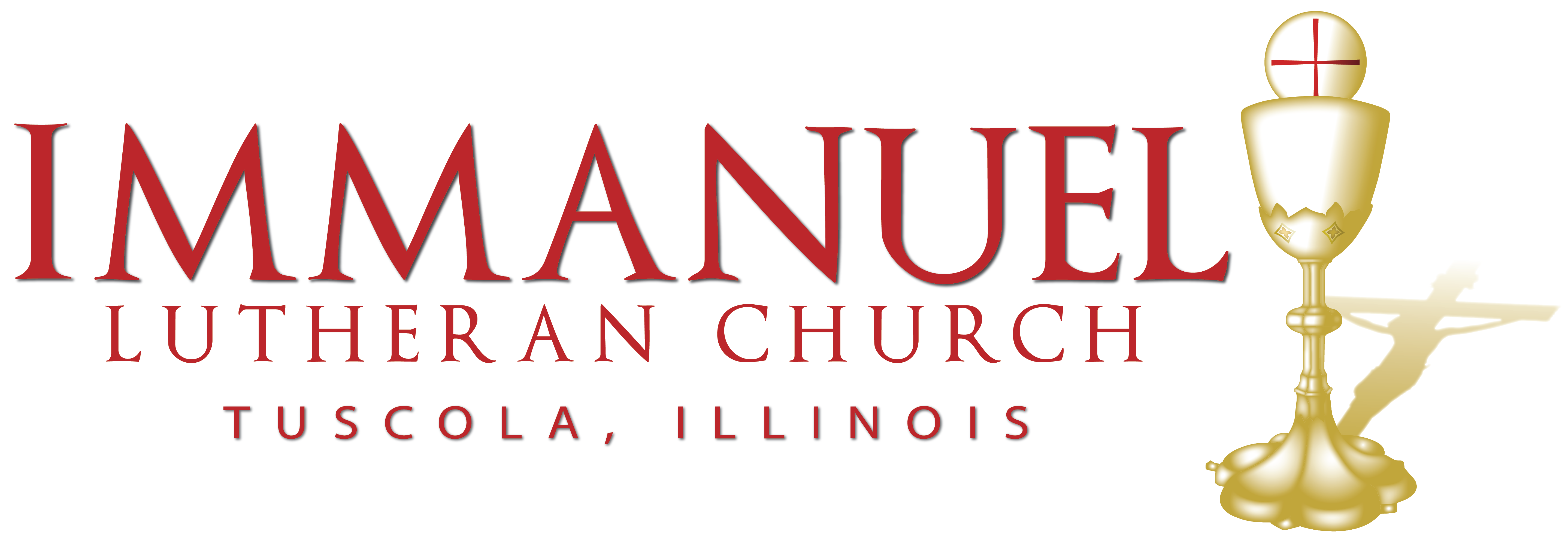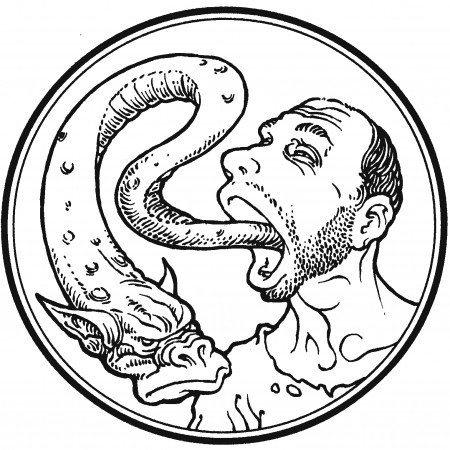The Third Sunday in Lent
Luke 11:14–28
+ IN NOMINE IESU +
“The fool says in his heart, ‘There is no God’” (Psalm 14:1). We’re not as crass as that. We’re not thorough-going atheists, even though it seems to be the cool thing to do these days. But we do have a tendency toward this kind of folly. Only we don’t always recognize it.
In the ancient world, to be a thorough-going atheist was rare too. More common was idolatry—the worship of false gods. The pagan of the ancient world could hardly fail to know that he was an idolater. His idols were visible and touchable. They were carved from physical substances like wood and stone. But we are much less likely to know that we’re idolaters, for our idols are invisible and untouchable. They are woven of sensations, wishes, and ideas, like pleasure, success, progress, and the future. In this way, idolatry is much more slippery than atheism. It gets right to the heart of the matter because that is where idolatry resides, where it begins and from where it comes—in the heart.
Whatever you put your trust in and set your heart on, this is your god. It is the thing from which we are to expect all good and in which we are to take refuge in all distress. If your faith and trust is right, then you have the true God. On the other hand, if it is misplaced, if it is wrong, then you do not have the true God. You have an idol. And the human heart is an idol factory (LC I:1–3).
So despite the invisible nature of our idols, we cannot claim ignorance of the evil of our idolatry or of the good of true worship and faith for precisely the reason that they both reside in the heart. We know full well our own idols, because we know our hearts. But we so convince ourselves that they are good rather than evil and what is truly good is in fact evil that we fail to fight it. Indeed, we are complicit in it. We give in to the desires of our hearts. By small increments we fudge here and there and think we have gotten away with it. But “sooner or later the summation of small evils leads to the triumph of evil itself” (Dalrymple, Our Culture, What’s Left Of It, 12). We have drunk so deeply from the well of this world’s prevailing thoughts, that we, like the Pharisees, accuse God of being in league with the devil, like drunkards lashing out against the bartender who tries to cut him off from further depravation. This is the epitome of folly. It needs to be left behind.
Idolatry is not neutral. It is demonic. It is the slippery slope by which the devil leads us into false belief and then other great shame and vice. The Pharisees understand this. The irony is that they refused to see their own idols when the true God was standing before them in the flesh. They shut their ears, and thus their hearts, to the truth of God’s pure and unadulterated Word because when it hit their ears, it pricked their hearts. So they became defensive. They fortified their idols by barricading their hearts. As the saying goes: “Throw a stone into a pack of dogs, and the one who yelps is the one who got hit.” The Pharisees were so entrenched in the worship of their idols that they cut themselves off from the true God. They lashed out accusing the Lord of being in league with Beelzebub, the prince of demons.
And our Lord calls them on it. He knows who He is, Who sent Him, and for Whom He speaks. He doesn’t need to defend it. He’s not threatened. He’s not embarrassed by it. He simply reminds them who they’re dealing with. He says, “But if it is by the finger of God that I cast out demons, then the kingdom of God has come upon you. When a strong man, fully armed, guards his own palace, his goods are safe; but when one stronger than he attacks him and overcomes him, he takes away his armor in which he trusted and divides his spoil.”
Our Lord is the stronger man. He overcomes the power of sin, death, and the devil by His death on the cross. And He puts the houses of our hearts in order. He expels the powers of darkness upon us in Holy Baptism. He makes the demons depart and makes room for the Holy Spirit to take up residence. But once an unclean spirit departs, he searches for another home, and when he can’t find one, he returns to find it swept and put in order. Then he goes and brings seven other spirits more evil than himself, and they dwell there.
Baptism is just the beginning. It is not a get out of jail free card. And if we’re not careful we will scatter ourselves from the Lord by not gathering with Him, being where He is. Thus our Lord would lead us to repent of our idolatry and recognize Him as the true God, to worship Him alone, and follow Him out of this world to our true home with His Father and ours in heaven.
But all this raises the question: What are your idols? I can’t answer that for you. For you know your hearts. You also know what God says. It has been inscribed on your heart. It is written into the very fabric of the universe. So you ask yourself these questions. To whom do I look for the highest good: God or someone or something else? Have I doubted God’s Word and thus committed idolatry by seeking my highest good from some other source: wealth from work or honor in sports or pleasure and community in ? Which one is more important when I make my daily decisions: God and his Word or myself? Have I doubted God’s love when I have money problems, loss of possessions, sickness or injury? Have I been discontent with what God has spoken of Himself in Christ and in the Scriptures? Do I find the study of God’s Word boring? What contradicts Him and His Word in my life? Does my self-consciousness, my pride, my sensitivity, my temper, my dissatisfaction, my laziness, my “rights,” my fearfulness, or weariness with my life contradict God and what He says?
For we all have times in our lives where stress, the pressure of work, the heart-break of interpersonal problems, physical or emotional suffering, that can lead us into thinking that God is league with Beelzebul, the prince of demons. Where we accuse God of evil, not knowing how He intends to bless us and others by it. It’s easy to fall into the mindset where because we don’t understand what’s going on, what God is doing, why He is doing it, or how He will use it for our good, we conclude that He’s not for us but against us. For if He gave us His own Son, how will He not give us all things? If He accomplished our salvation and worked good for all of creation by His own Son’s death on the cross, how will He not work good for us when we are suffering and weak? And so we do foolish things that play right into the hand of the devil.
We stop attending the Divine Service. We cut ourselves off from the grace of God by cutting ourselves off from His divinely instituted means of delivering that grace. It’s a temper tantrum of sorts. I’ll show you God by not coming to receive your gifts that deliver what we need most. For our Lord is clear: Remember the Sabbath Day by keeping it holy (Exod 20:8). This is folly, for when we do this we only hurt ourselves.
Or we stop giving to the church or divert it to someplace else. We get upset by something, and so we stop giving back to Him what He has first given to us. But our Lord is clear: Anyone who receives instruction in the Word must share all good things with his instructor. Do not be deceived: God cannot be mocked. A man reaps what he sows (Gal 6:6–7). This is folly, for when we do these things we only hurt ourselves.
Or we come to church but we honor Him only with our lips, but our hearts are far from Him. We’re just going through the motions, perhaps not even that, perhaps we’re just sitting in the pew. This happens when we become indifferent toward God and His Word; where because of some problem or something else in our life, we here but we don’t want to be. We’d rather be someplace else. And we see God as in league with the prince of demons. We accuse Him of evil and so we attend but we don’t care. This is folly too, for we no longer seek from God the highest good, but have shut our ears and barricaded our hearts with indifference toward Him.
All of this misses the forest for the trees. And it is folly because it kills faith, and leaves our cleansed hearts by virtue of Holy Baptism ready and waiting for the demons to return sevenfold. Leave this folly behind. Take a step back out of the forest so that you can see the whole thing. For God has not abandoned you. He’s not left you as orphans. Nor is He vindictive or punishing you. He is working as He always has: through weakness for your good. He was crucified, and our sins put Him there. And on the third day He was raised from the dead and was not angry but merciful, forgiving, and bestowing peace.
God’s power is made perfect in weakness. The foolishness of God is wiser than men and the weakness of God is stronger than men (1 Cor 1:25). The word of the cross is folly to those who are perishing, but to us who are being saved it is the power of God and the wisdom of God (1 Cor 1:18). So we preach Christ crucified. For we are not those who are perishing but those who are being saved. And He gives us this salvation by grace through the Word and the Sacraments.
And that changes everything and changes nothing. For even though you still suffer and you still can’t make sense of all that is happening, it does destroy your idols, the things that you look to find comfort and the highest good. And so in that sense, it changes everything. For you do know that it has a purpose and that our gracious Lord is using it for your good even if you can’t see it.
So come and receive the Body and Blood of Him who died and was raised to bring you home. It will nourish your faith so that you can have strength to face today and courage to face tomorrow. Amen.



0 Comments